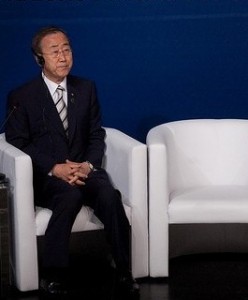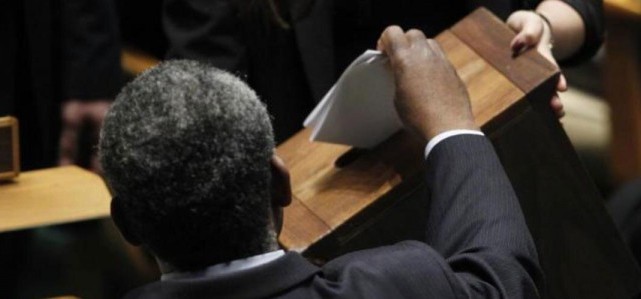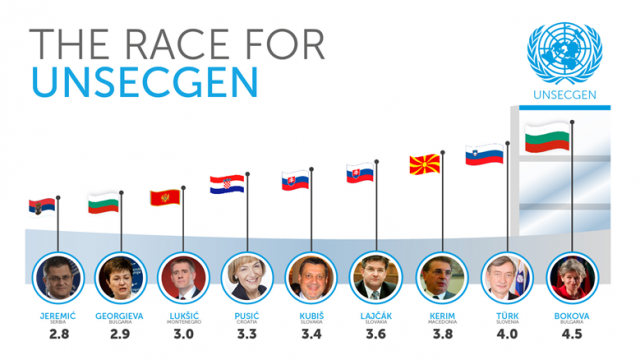August 5: Inner City Press notes that Ban has received yet another vote of no confidence from the UN Staff Union. The resolution cites “the systemic lack of personal accountability and transparency [which] has become more serious since the current Secretary General took office.”
—
It’s looking more and more every day that I need to resurrect my former blog, UNSG.org, and again ask, who will be the next Secretary General of the UN? Judging from the past year, it doesn’t appear that it will be Ban Ki-moon for round two.

Ban’s performance has suffered almost constant criticism from day one of his administration, but one could consider the past twelve months to be his “annus horribilis,” when the evaluations from media, governments and independent experts have been down right harsh. Unlike the bad year which his predecessor experienced, however, Ban is suffering not from criticism of and scandal at the institution he leads, but from his leadership itself of the institution, or rather the astute lack thereof.
Just a sampling of the performance critiques since he assumed office in 2007:
- In August 2007 – less than eight full months into Ban’s term – the UN Staff Council called on Ban to correct “a culture of impunity permeating the higher levels of the Organisation.”
- In January 2008, Phyllis Bennis, Director of the New Internationalism Project at the Washington-based Institute for Policy Studies, stated that Ban’s performance to date and “…what appears to be his future approach do not reflect anything close to the independence, strength of character, willingness to stand up to powerful governments and commitment to equality of nations and peoples.”
- In June 2009, harsh reviews appeared in the Financial Times, The Economist, the London Times and Foreign Policy. In the latter, contributor Jacob Heilbrunn suggested that Ban had “set the standard for failure” among Secretary Generals. The Economist scored Ban’s management performance as 2 out of 10 and his ability to lead as 3 out of 10. The month, the UN Staff Union cast a unanimous vote of no confidence in Ban related to his implementation of the UN’s Capital Master Plan and human resources management.
- In August 2009, Norway’s Deputy Ambassador to the UN, Mona Juul, sent a memo to his bosses in Oslo that not only seemed to validate media criticism, but took it to a level that calling it undiplomatic would itself be diplomatic. The memo utterly excoriated Ban’s performance, referring to his performance as “spineless and charmless,” “absent,” “incapable” and a “one-term SG.” Following this leaking of this memo, a source close to this blog judged Ban’s chances of a second term as “50/50.”
- This month, the head of the UN anti-corruption agency, Undersecretary-General Inga-Britt Ahlenius, offered a “blistering” rebuke to Ban in stepping down from the post. Her blunt, personal memo to Ban states, “Your actions are not only deplorable, but seriously reprehensible. No UN Secretary General before you has questioned the authority delegated to the [under secretary general of OIOS] to appoint the staff in OIOS. Your action is without precedent and in my opinion seriously embarrassing for yourself.”
Ban’s critics have complained that he has been mostly ineffectual if not entirely absent in using his offices to engage on many of the world’s critical crises during his administration, such as Myanmar and Sri Lanka.
Ban’s supporters have at times been almost apopletic in their defense, suggesting the SG was spending his political capital on his priority issue of climate change (Copenhagen, anyone?), accusing critics of not giving the SG enough time to accomplish the transformation he pledged to undertake when he took office, shifting blame to member states or the “bureaucracy” at the UN, or suggesting that Ban is striking the proper and necessary balance between being the UN’s CEO and offering “genuine visionary leadership.”
Any one of these might have been justifiable had the criticism not been as persistent and pervasive as it has been. But at this point, such apologies are getting a bit embarrassing.
James Traub, contributing writer at New York Times Magazine and author of a critical look at Kofi Annan’s tenure as UNSG, concluded this month that it’s just time to tell Ban good-bye.
States that care about the United Nations — and above all, the United States — should prevent him from doing further harm to the institution by ensuring that he does not serve a second term.
…
[The U.S.] Administration officials should be quietly consulting China and other allies, and should be looking for candidates — Asian or not — with the strength and stature to lead the organization. Ban Ki-moon is not such a man.
There have already been a few names floated as possible successors to Ban, including Lula da Silva of Brazil, Helen Clark of New Zealand (currently UNDP Administrator), and possibly Kevin Rudd of Australia. Over the next couple of weeks, we’ll look at the potential of challengers to Ban’s re-nomination and other factors that may determine his chances in 2011.





2 thoughts on “Can Ban survive?”